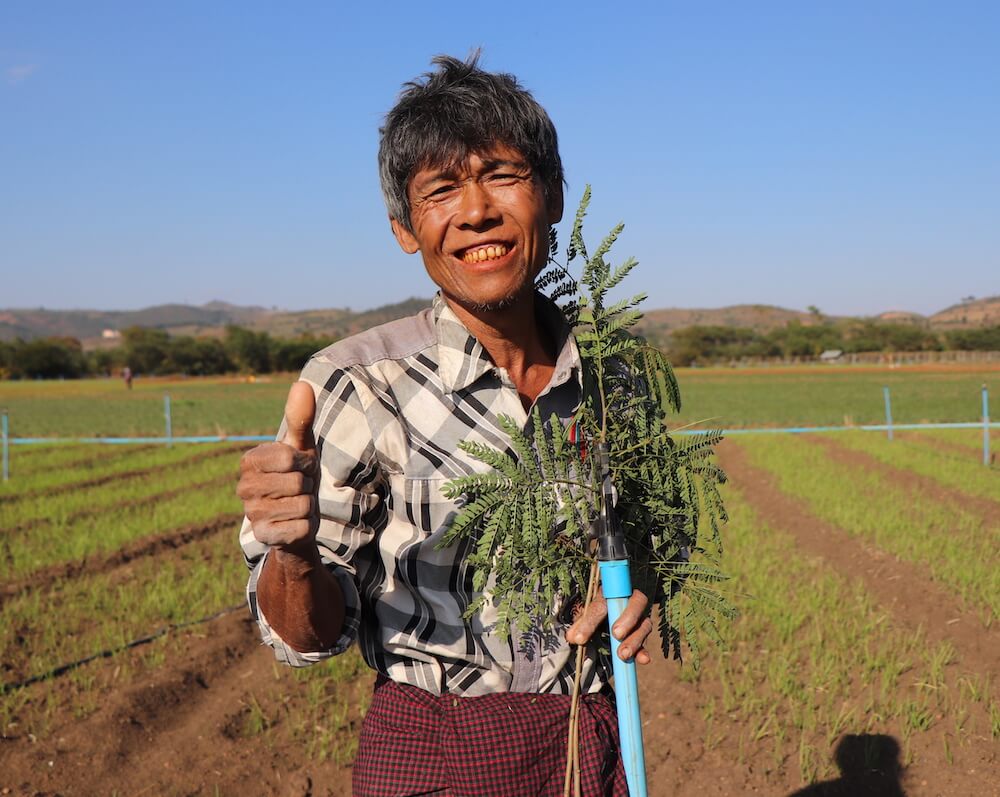
The arrival of COVID-19 has brought unprecedented challenges for both developing and developed countries, creating a perfect recipe for economic turmoil on top of a health crisis. Here at Maha Agriculture Public Co., Ltd. (“Maha”), an MFI primarily serving rural smallholder farmers in Myanmar, the onset of this crisis has been a rollercoaster ride as we try to support our farmers whose work is crucial for Myanmar’s food supply and economy.
While doing so, we have had to adapt to regulatory and government directives, keep lenders reassured and, most importantly, stand by our clients and employees who rely on us during this difficult time.
In the following sections, we share the three biggest aspects we have had to contend with in our response to this crisis and the challenges they have presented us.
Regulators
Advocating for Direction and Guidance to Support Microfinance
The regulatory environment is one aspect that remains largely out of our control or influence. We are regulated by the Financial Regulatory Department (FRD) under the Ministry of Planning, Finance, and Industry, while banks, mobile money operators and all other NBFIs are regulated by the Central Bank of Myanmar (CBM). The FRD is a supervisory body under a political ministry, which is subject to influence that can sometimes result in biased decision making to the detriment of the entities within its purview, as well as those they serve. One example of this is FRD’s directive 2/2010 because it did not fully address the concerns of most MFIs.
Issued on April 6th in response to the current COVID-19 crisis, the directive requires all MFIs to limit their branch staff to a maximum of five people and suspend regular disbursements and repayments (Maha had already introduced social distancing measures on March 19th and reduced the number of farmers at any given time in our branches from groups of 50 plus down to groups of 5); exceptions have been made for emergency loans, voluntary repayments, and withdrawal of savings. The directive also suspended regular activities such as licenses, expansions, and approval of new financial products by the Microfinance Business Supervisory Committee under the FRD. This temporary suspension will be applicable until the end of April at the time of writing.
The period before this announcement saw various measures taken by local authorities, such as stopping MFI operations – and mandating the rescheduling of all microloans – in the Mandalay, Sagaing, Ayeyarwaddy, Shan and Magway regions, where we have 20 of our 32 branches, until April 30th. In addition, without any consultation with the FRD, the Mandalay regional government required all MFIs to waive interest on loans, a move that could potentially threaten their survival.
The Mandalay regional government required all MFIs to waive interest on loans, which could threaten their survival.
In this situation, having the regulator step up for the microfinance industry is essential not only for us but also for our farmers, who now face additional hurdles in cultivating for the upcoming season. This matters for farmers like U Ko Oo, our client since 2015, who grows sesame and peppers in Kyaukse Township in the Mandalay region and is currently struggling to purchase agricultural inputs due to movement restrictions. He also fears not being able to access credit, without which he’ll struggle to meet farming costs for the coming monsoon season that produces roughly 70 percent of the country’s annual rice consumption. He tells us that his livelihood depends on the services we provide. Our farmers aren’t able to sell their crops, repay their loans or obtain new loans, not because of COVID-19, but because of these lockdown and movement restrictions.
Our farmers aren’t able to sell their crops, repay their loans or obtain new loans because of lockdown and movement restrictions.
To be able to support farmers like U Ko Oo, we are constantly advocating with local authorities and taking collective action through the Myanmar Microfinance Association (MMFA) to lobby for uniform directions and guidance for the sector. During this crisis, we would benefit from fast-track approval of new equity and debt capital as well as new financial products and non-financial services. Relaxation of regulatory requirements in terms of key ratios and rescheduling of principal/repayments by MFI lenders to mirror regional lockdowns in Myanmar would provide further support. Finally, relief for MFIs on taxes, stamp duties and the like — similar to that offered to SMEs and other sectors — along with revisions and guidance on how to handle loan rescheduling and defaults without incurring loan loss provisioning, would be helpful.
On a broader level, the MMFA is diligently advocating and educating all stakeholders that maintaining the continuity and viability of MFIs like us is essential, as farmers who form the backbone of the economy will need to continue farming. Finally, when the crisis comes to an end, we will play an important role in poverty alleviation and serve as a safety net for farmers who remain a vulnerable segment in Myanmar.
Lenders
Three Ways to Address Potential Financial Deterioration
It is natural that during such a time, our lenders are concerned about the health of their outstanding loans to us. Thus, reassuring them and discussing new arrangements is important to weather this storm. Maha has adopted a proactive approach by informing lenders of the steps that are being taken in response to COVID-19. The information package we provide addresses the health and safety of employees and customers, business continuity, liquidity, cash flow and credit risk. Finally, an important aspect of this information package is keeping lenders abreast of regulatory directives such as mandatory moratoriums and rescheduling of loans, so they have a complete understanding of the situation on our end.
Keeping lenders abreast of regulatory directives is important.
When we approach lenders, we address three important ways in which to alleviate the financial deterioration we may experience in the coming weeks and months. The first is a relaxation of loan covenants for a period of 6 to 12 months to allow us time to improve our financial health. The second would be a moratorium on principal and/or interest repayments to avoid a liquidity crunch, as we are in turn expected to provide these to our clients in certain areas (for example, in the Mandalay and Sagaing regions) due to government directives. Third, should we need additional liquidity we will request emergency loans with subsidized interest rates from our lenders to ride out this storm. As we initiate these steps to remain financially healthy, we call on lenders to demonstrate their commitment to positive social impact in this time of crisis by continuing to support institutions like Maha that serve the most vulnerable segments of society. It’s in times like these when microfinance investment vehicles (MIVs) and responsible asset management firms really should walk their talk.
Clients
Working to Access Markets and Prepare for Cultivation
As an MFI serving rural farmers in Myanmar, the response to this third aspect needs to be designed based on realities on the ground. The lockdown imposed by local authorities in certain regions has left farmers with no avenue to sell their crops, as they cannot leave their villages and brokers cannot enter to buy their crops either. Moreover, only five wholesale dealers from a total of 30 remain open. This has sparked concerns about the supply chain for wet crops such as onions and fruits, in particular. The busiest bazaar held once every five days in Aung Ban, Shan State remains closed, preventing vegetable vendors, like our clients U Myint Aung and Daw Htein Htay, from selling their stock before going bad; they haven’t had any income for over 20 days. They tell us that they would like to keep borrowing from us even as their income reduces, since borrowing from moneylenders, whose interest rates could be up to double those of MFIs, is too expensive for them. Consequently, we expect to see increased delinquencies, which may give rise to clients borrowing informally at higher interest rates.
We expect to see increased delinquencies, which may give rise to informal borrowing at higher interest rates.
While repayments are crucial to our financial heath, practicing responsible lending in line with Smart Campaign’s Client Protection Principles remains embedded in our practices as we respond to this crisis.
A Few Simple Measures Can Go a Long Way
We have given clear guidelines to our field staff on how to interact with clients and have emphasized that no form of direct or indirect pressure should be put on them to repay loans. We have also given progressive cash discounts as incentives to our farmers to make early repayments on their loans where they are able to do so. Since launching this discount, 69.9% of repayments received have been prepayments. Moreover, in branches in regions where loans had already been rescheduled due to the local authority’s mandate, 10% of such loans have now been repaid due to the Maha cash discount scheme. This measure is proving to be successful thus far, with clients feeling supported during these emotionally and economically difficult times.
Finally, many farmers are awaiting new loans to be able to start cultivating for the next season, the monsoons season; it’s therefore imperative that we continue operations, albeit in a limited capacity, to serve farmers that rely on us. If farmers cannot access credit, the subsequent delay in cultivation of their crops may create a ripple effect and make it harder for them to come out of this economic shock. Needless to say, operations must continue in line with a strict implementation of health guidelines, including protective gear and physical distancing. At Maha, this is being implemented, together with awareness campaigns, through the distribution of pamphlets that specify dos and don’ts to educate clients and avoid the spread of misinformation.
Conclusion
This is the time for us to push forward with our ethos of customer centricity.
This is the time for us to push forward with our ethos of customer centricity. Many of our clients like U Ko Oo, U Myint Aung and Daw Htein Htay rely on us and need us to continue serving them through this crisis. While solutions are not always simple, this crisis need not be a trade-off between economic wellbeing and good health. An innovative and well-planned strategy that balances both can ensure that we continue operations while taking necessary measures to guard against the risks of exposure posed by the traditionally high-touch MFI model.











